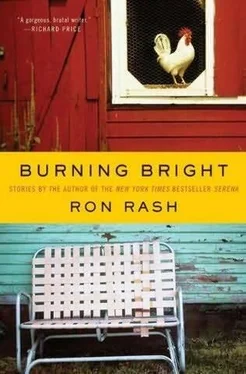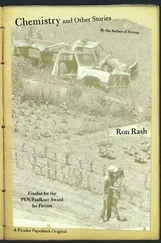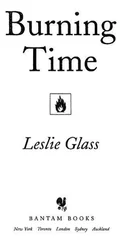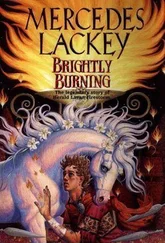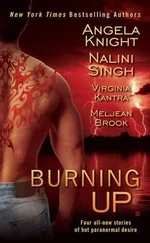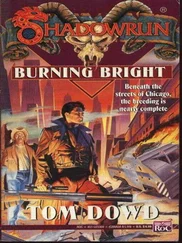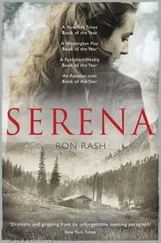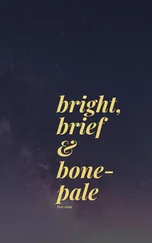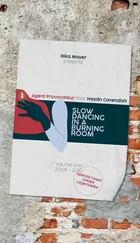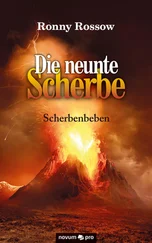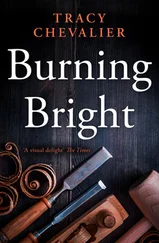“I got a shovel and a pickax,” I say. “I know how to do more than lean on them too.”
He knows my meaning but just laughs, tells me what he’s got his mind scheming over. I start to say there’s no way in hell I’m doing such a thing but he puts his hand out like stopping traffic, tells me not to yes or no him until I’ve had time to sift it over good in my mind.
“I ain’t hearing a word till tomorrow,” he says. “Think about how a thousand dollars, maybe more, could put some padding in that wallet. Think about what that money can do for your momma.”
He says the words about Momma last for he knows that notion will hang heavy on me if nothing else does.
I go by the hospital on the way home. They let me see her for a few minutes, and afterward the nurse says she’ll be able to go home in three days.
“She’s got a lot of life in her yet,” the nurse tells me in the hallway.
That’s good news, better than I expected. I go down to the billing office and the news there isn’t so good. Though I’ve already paid three thousand I’ll be owing another four by the time she gets out. I go back to my trailer and there’s no way I can’t help pondering about that money Wesley’s big-talking about. I think about how Daddy worked himself to death before he was sixty and Momma hanging on long enough to be taught that fifty years of working first light to bedtime can’t get you enough ahead to afford an operation and a two-week stay in a hospital. I’m pondering where’s the fair in that when there’s men who do no more than hit a ball good or throw one through a hoop and they live in mansions and could buy themselves a hospital if they was to need one. I think of the big houses built up at Wolf Laurel by doctors and bankers from Charlotte and Raleigh. Second homes, they call them, though some cost a million dollars. You could argue they worked hard for those homes, but no harder than Momma and Daddy worked.
By dawn I know certain I’m going to do it. When I say as much to Wesley at our morning break he smiles.
“Figured you would,” he says.
“When?” I ask.
“Night, of course,” he says, “a clear night when the moon is waxed up full. That way we’ll not give ourselves away with a flashlight.”
And him thinking it out enough to use moonlight gives me some confidence in him, makes me think it could work. Because that’s the other thing bothering me besides the right and the wrong of it. If we get caught we’d be for sure doing some jailhouse time.
“I done thought this thing out from ever which angle,” Wesley says. “I been scouting the cemeteries here to Flag Pond, looking for the right sort of graves, them that belongs to officers. I’m figuring the higher the rank the likelier to be booty there, maybe even a sword. Finally found me a couple of lieutenants. Never reckoned to find a general. From what I read most all them that did the generaling was Virginians. Found Yankee soldiers in them graveyards as well, including a captain.”
“A captain outranks a lieutenant, don’t he?” I ask.
“Yeah, but them that buys this stuff pay double if it’s Confederate.”
“And you can sell it easy?” I say. “I mean you don’t have to fence it or anything like that?”
“Hell, no. They got these big sellings and swappings all over the place. Got one in Asheville next month. You show them what you got and they’ll open their billfolds and fling that money at you.”
He shuts up for a moment then, because he’s starting to realize how easy it all sounds, and how much money I might start figuring to be my share. He lays his big yellow front teeth out on his lower lip, worrying his mind to figure a way to take back some of what he just said.
“Course they ain’t going to pay near the price I showed you on them sheets. We’ll be lucky to get half that.”
I know that for a lie before it’s left Wesley’s lips, but I don’t say anything, just know that I’ll damn well be there with him when he sells what we find.
“What do we do next?” I say.
“Just wait for a clear night and a big old harvest moon,” Wesley says, looking up at the sky like he might be expecting one to show up any minute. “That and keep your mouth shut about it. I’ve not told another person about this and I want it to stay that way.”
Wait is what we do for two weeks, because that first night I look up from my yard the moon’s all skinny and looks to be no more than something you might hang a coat on. Every night I watch the moon filling itself up like a big bowl, scooting the shadows out in the field back closer to the trees. Momma’s back home and doing good, back to where she’s looking more to be her ownself again. The folks at the hospital say she’ll be eligible for the Medicaid come January and that’s all for the good. That means I can go with Wesley just this one time, pay off that hospital bill, and be done with it.
Finally the right night comes, the moon full and leaning down close to the world. A hunter’s moon, my daddy used to call it, and easy enough to see why, for such a moon makes tramping through woods a lot easier.
Tramping through a graveyard as well, for come ten o’clock that’s what we’re doing. We’ve hid his truck down past the entrance, a few yards back in a turnaround where, at least at night, no one would likely see it. We don’t walk through the gate because that’s where the caretaker’s shack is. Instead we follow the fence up a hill through some trees, a pickax and shovel in my hands and nothing in Wesley’s but a plastic garbage bag. It’s late October and the air has that rinsed-clean feel. There’s leaves that have fallen and acorns and they crackle under my feet, each one sounding loud as a.22 to me. I catch a whiff of a woodstove and find the glow of the porch light.
“You ain’t worried none about that caretaker?” I say.
“Hell no. He’s near eighty years old. He’s probably been asleep since seven o’clock.”
“He’d not have a fire going if he was asleep.”
“That old man ain’t going to bother us none,” Wesley says, saying it like just his saying so makes it final.
We’re soon moving amongst the stones, the moon brighter now that we’re in the open. Its light lays down all silvery on the granite and marble, on the ground itself. It’s quieter here, no more acorns and leaves, just cushiony grass like on a golf course. But it’s too quiet, in a spooky kind of way. Because you know folks are here, hundreds of them, and not a one will say ever a word more on this earth. The only sound is Wesley’s breathing and grunting. We’ve walked no more than a half mile and he’s already laboring. A car comes up the road, headlights sweeping over a few tombstones as it takes the curve. It doesn’t slow down but heads on toward Marshall.
“I got to catch my breath,” Wesley says, and we stop a minute. We’re on a ridge now, and I can see a whole passel of stars spilled out over the sky. As clear a night as you can get, and I reckon it’s easy enough for God to see me from up there. That thought bothers me some, but it’s a lot easier to have a conscience about something if you figure it all the way right or all the way wrong. Doing what we’re doing is a sin for sure, but not taking care of the woman who birthed and raised you is a worse one. That’s what I tell myself anyway.
“It’s not much farther,” Wesley says, saying it more for his own benefit than for me. He shakes his shoulders like a plow horse getting the trace chains more comfortable and walks down the yonder side of the hill until he comes to where a little Confederate flag is planted by a marble tombstone.
“Kind of them Daughters of the Confederacy biddies to sight-map the spot for us,” Wesley says.
Читать дальше
